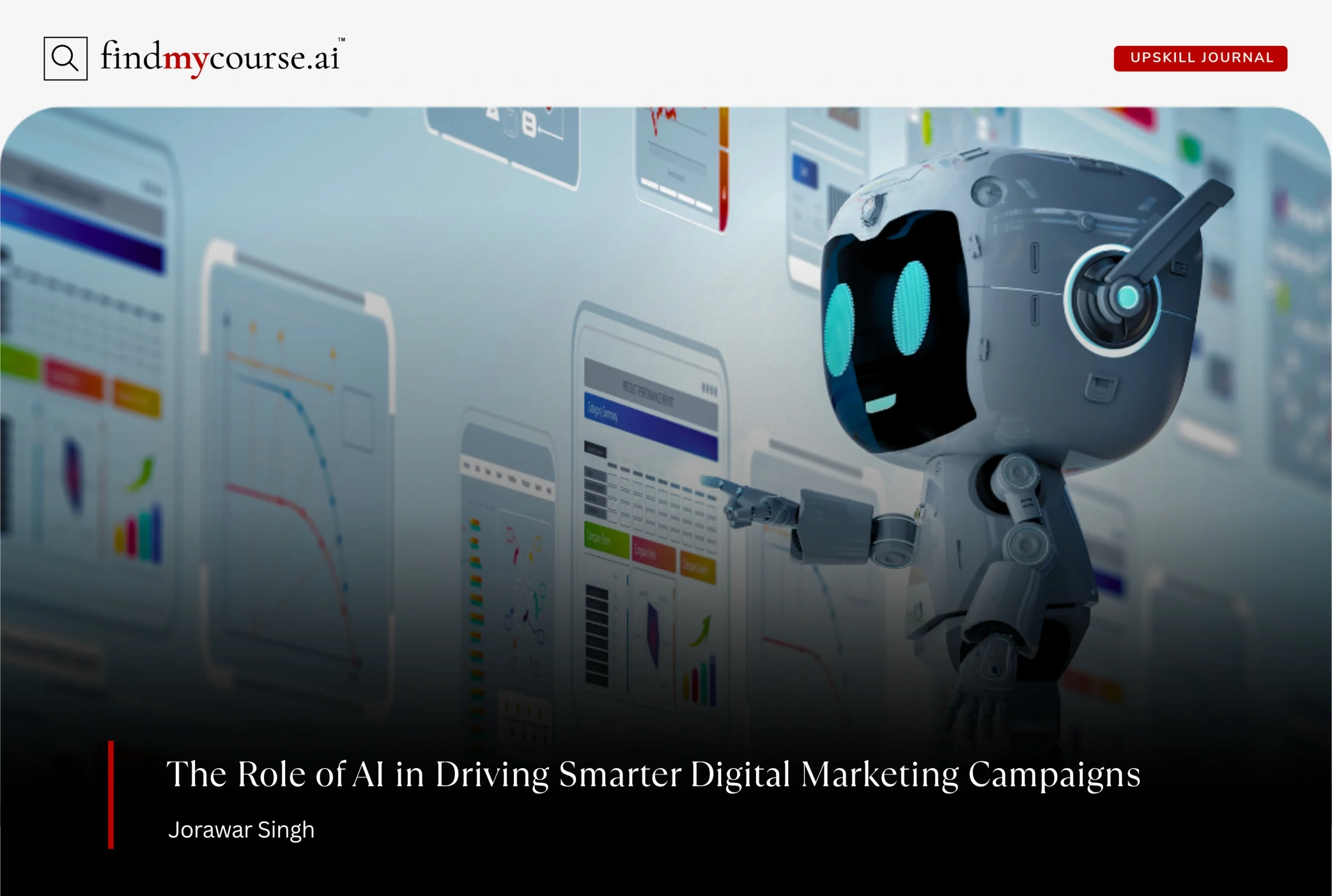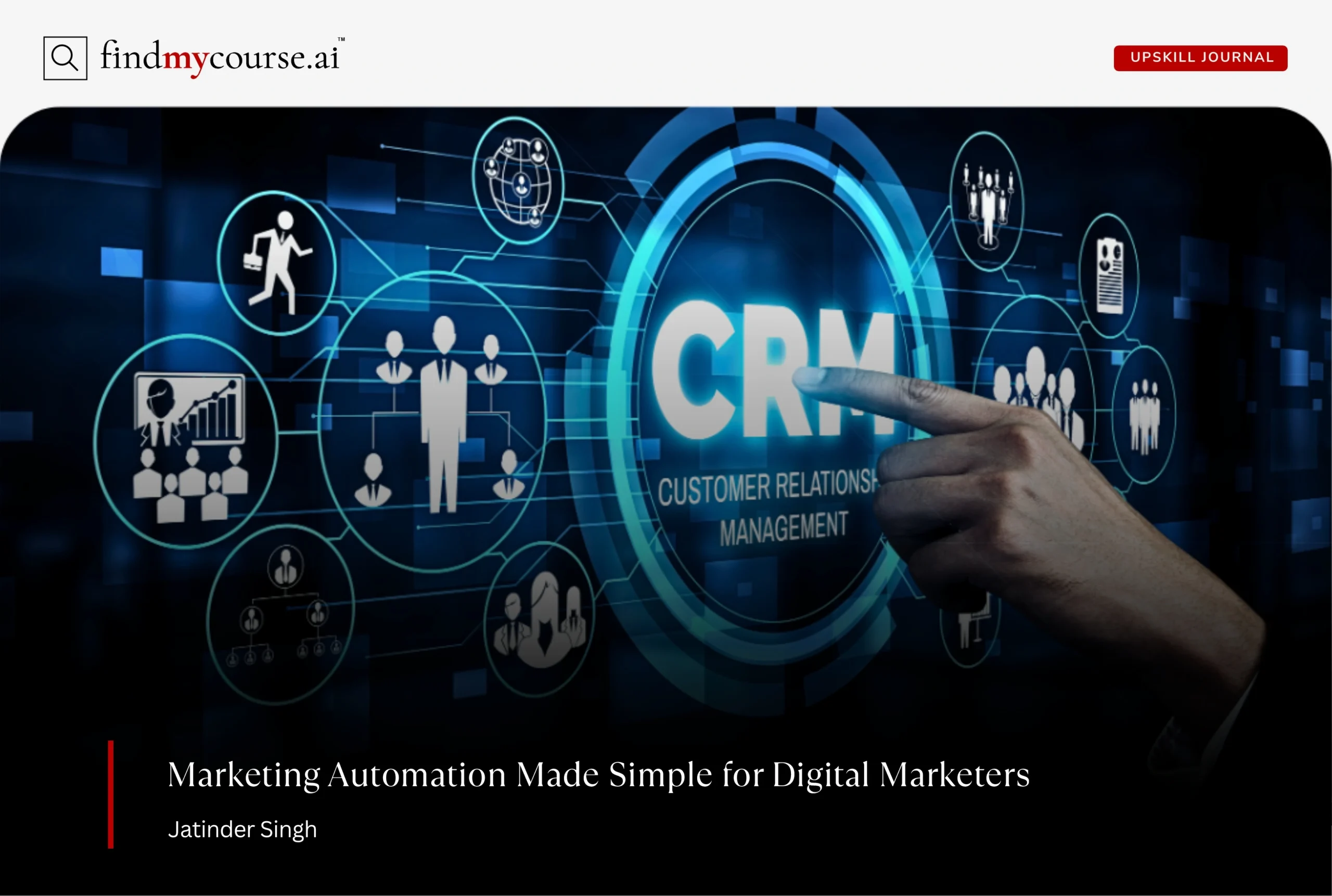Marketing has always been about creating connections—understanding people, anticipating their needs, and delivering value. As the digital era took hold, it evolved into digital marketing, opening doors to data-driven strategies, online engagement, and powerful tools to reach audiences at scale. Today, artificial intelligence is taking this a step further. AI in digital marketing has automated many tasks, helped uncover deep customer insights, and made it possible to deliver more personalized and creative experiences. It’s changing the way brands work and how customers connect with them. In 2026, keeping pace means more than just knowing the tools—it means upskilling to thrive in a future where AI is at the center of marketing innovation.
What is AI in Digital Marketing?
AI in digital marketing includes technologies like machine learning, natural language processing (NLP), generative AI, predictive analytics, and chatbots. These tools help marketers improve targeting, create content, automate processes, gain insights, and enhance customer experiences.
- Machine Learning: Detects patterns in user behavior to forecast trends and segment audiences effectively.
- Generative AI: Accelerates content creation, including text, images, and videos.
- Predictive Analytics: Provides data-driven guidance to inform marketing decisions, reducing reliance on guesswork.
Together, these AI technologies empower marketers to work smarter, not harder. By leveraging AI, brands can deliver more relevant, timely, and engaging experiences that resonate with their audiences.
Key Roles of AI in Digital Marketing
Artificial Intelligence is reshaping digital marketing by making campaigns more targeted, efficient, and insight-driven. Its core value lies in three major applications: personalization, automation, and predictive analytics.
Personalization and Customer Experience
AI allows marketers to move beyond general assumptions and deliver experiences tailored to each customer. By analyzing behavior, preferences, and interactions, AI can predict needs and respond instantly.
- Delivers dynamic content and customized offers.
- Tracks customer journeys and adapts recommendations in real time.
- Tailors messaging to individual preferences at scale.
This level of personalization not only increases relevance but also builds deeper trust and loyalty, positioning brands ahead of competitors in meeting rising consumer expectations. Tools like Adobe Target and Dynamic Yield help brands implement these personalized experiences efficiently.
Automation and Efficiency
AI in digital marketing reduces the burden of repetitive marketing tasks, enabling teams to focus on creative and strategic work. It ensures consistency, accuracy, and speed across multiple channels while optimizing performance.
- Automates email campaigns, social media posting, and ad bidding.
- Powers chatbots for round-the-clock customer support.
- Streamlines outreach and performance analysis.
By automating these functions, marketing teams free resources, reduce costs, and execute campaigns faster, ensuring brands remain agile in a fast-paced digital environment. Platforms like Mailchimp and Hootsuite make this level of automation seamless and scalable.
Data-Driven Insights and Predictive Analytics
AI excels at processing large volumes of marketing data, uncovering patterns that humans might miss. It empowers brands to make informed decisions that are evidence-based rather than intuition-driven.
- Identifies patterns and predicts customer behavior with precision.
- Highlights campaigns most likely to succeed and guides allocation.
- Optimizes budgets by revealing high-impact channels.
This predictive approach strengthens decision-making, enhances efficiency, and allows brands to deliver the right message at the right time, leading to improved engagement, higher conversion rates, and stronger long-term retention. Tools like IBM Watson Marketing help marketers turn insights into actionable strategies.
Content Creation and Optimization
AI assists marketers in producing high-quality content efficiently while optimizing it for engagement, SEO, and audience relevance. From drafting copy to generating visuals and video snippets, AI enables faster iteration and experimentation.
- Generates copy, visuals, and videos for campaigns at scale.
- Optimizes content based on audience behavior and SEO insights.
- Supports A/B testing and continuous content improvement.
By integrating AI into content workflows, brands can maintain consistency, reduce production time, and adapt messaging quickly to audience preferences. Tools like Jasper and Canva AI help streamline creative processes while preserving brand voice and quality.
Emerging AI Trends in Digital Marketing
AI in digital marketing is transforming the way brands create content, manage campaigns, and engage with customers. From generating creative assets to autonomously optimizing ad spend, marketers are leveraging AI to work faster, smarter, and more efficiently while navigating ethical and regulatory considerations.
| Trend | Description | Examples / Use Cases | Key Considerations |
| Generative AI & Creative Innovation | AI tools create copy, visuals, videos, and product mockups. They support rapid prototyping, content drafts, and creative ideation, enabling teams to maintain quality while producing ideas faster. | Tools like ChatGPT, MidJourney ; rapid ad copy, social media visuals, video snippets, product design mockups | Ensure outputs are reviewed for brand alignment and quality; monitor for copyright or originality issues. |
| Autonomous Campaigns & Agentic AI | AI systems manage tasks autonomously, such as modifying ad spend, optimizing audience targeting, or updating creative variations in real time. These systems reduce manual intervention and decision delays. | Platforms like Albert, Adext AI; autonomous ad bidding, dynamic audience targeting, creative A/B testing | Monitor AI decisions to prevent unwanted biases; maintain human oversight for brand safety and campaign goals. |
| Ethics, Privacy, and Trust | With AI scaling, concerns about privacy, bias, transparency, and authenticity grow. Marketers must use clean, unbiased training data, handle consumer data ethically, and disclose AI-generated content appropriately. | GDPR, CCPA compliance, AI content disclosure practices, bias audits | Embed ethical guardrails, transparency protocols, and regulatory compliance in all workflows; ensure consumer trust is maintained. |
What’s Next for AI in Digital Marketing
AI’s role in digital marketing is set to grow significantly, transforming how brands understand, engage, and serve customers. Emerging trends suggest not just efficiency gains, but a deeper integration of AI into strategy, creativity, and governance. Key trajectories include:
- Predictive personalization: Anticipating customer needs even before they express them, enabling highly relevant experiences.
- Full-funnel automation: Coordinating every stage of customer engagement—from awareness to loyalty—through AI-driven workflows.
- AI-driven creative collaboration: Humans and machines working side by side in ideation, art direction, and content execution to enhance creativity.
- Stronger governance & trust: Building transparent, ethical AI practices that strengthen customer relationships and brand credibility.
Professionals who embrace these shifts, invest in complementary skills, and uphold human values such as authenticity and creativity will be best positioned to lead in this AI-powered marketing era.
Conclusion
AI in digital marketing is reshaping it by making it more personalized, efficient, and data-driven. It helps brands understand customers better, automate routine tasks, and create content faster while providing actionable insights. As AI continues to evolve, marketers who learn to use these tools effectively and ethically will be better positioned to meet customer expectations and stay competitive.
Embracing AI does not replace human creativity or judgment—it enhances it, allowing brands to deliver more meaningful experiences. And if you want to explore how AI can improve your marketing strategies, our AI assistant can help guide you in the right direction.


